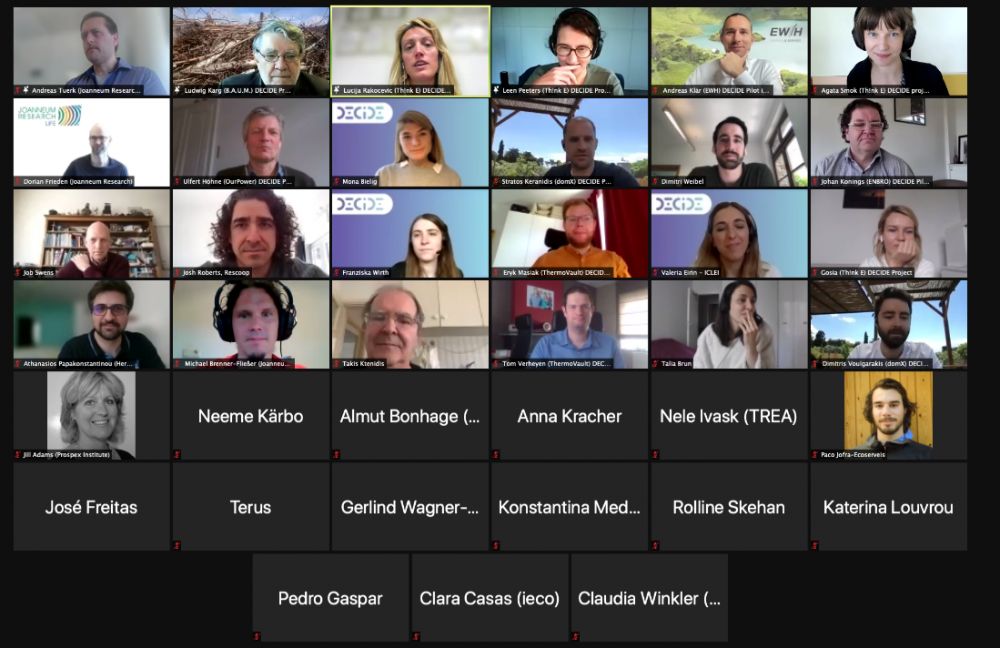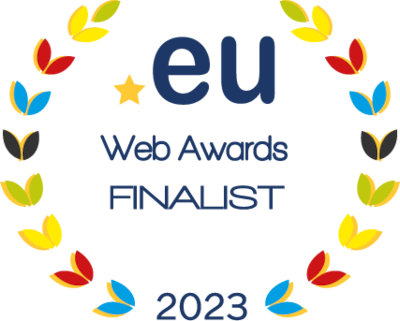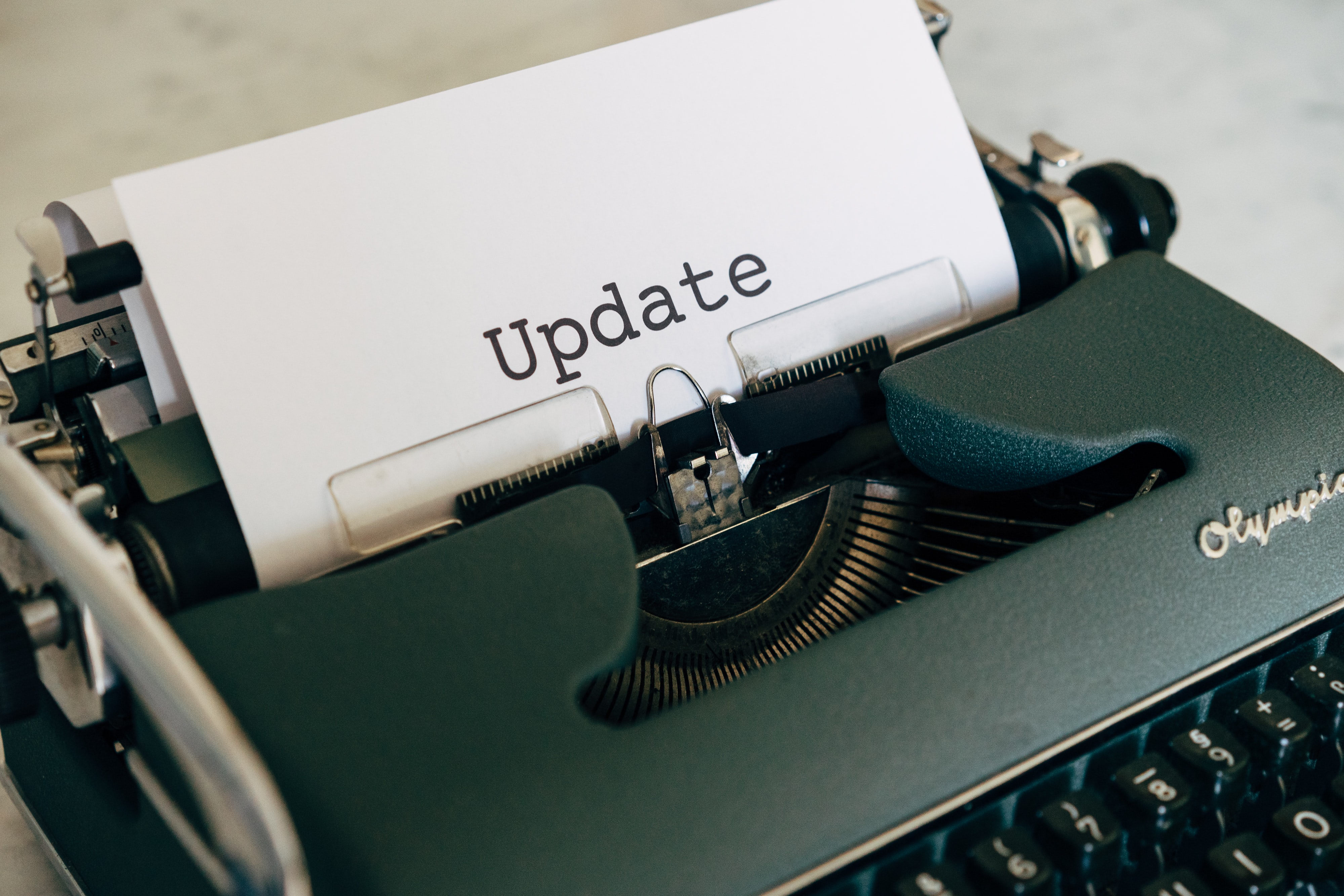
Let's talk about change
07 Jun 21
During the DECIDE and COMMIT online event that took place on 17 and 18 May speakers and participants shared stories, invited dialogue, sparked connections, and had meaningful conversations with each other.
The following highlights are takeaways from the two-day event:
Keynote on intelligent ways of managing energy supply and demand
Job Swens, J-OB, University Groningen. Watch recording
- Regulatory barriers, such as double energy tax on stored electricity or sharing not distinguished from supplying, may interfere with the progress of, or even block, the implementation of energy communities and collective actions. For example, due to legal issues, setting up of the Schoonschip floating neighbourhood in in North Amsterdam (the Netherlands) took almost 12 years.
On replication
Franziska Width, BAUM Consult. Watch recording
- Replicants provide wider pool of sites for collecting data on how energy communities and collective actions are organized and successful approaches
- DECIDE has ongoing open call for Replicants to get involved and collaborate with DECIDE partners
How human connection drives change
Florian Kutzner, Mannheim University (DECIDE partner). Watch recording
- It is crucial to use the existing community organizations and capitalize on active identities as a starting point for collective pro environmental actions.
- Communication methods should be designed such that they correspond to different action phases (inception/ foundation/ initial operation/ maintain operation/ upscaling and diversification).
- It is important to avoid the “one-fits-all approach”, understand all stakeholders, build on the existing, establish trust and use participatory methods and keep rebounds in mind.
Getting involved: Opportunities to learn, engage and exchange
Carsten Rothballer, Julia Kittel, ICLEI Europe and Franziska Wirth and Ludwig Karg, B.A.U.M. Consult. Watch recording
- Through the replication process, DECIDE allows for increased involvement of initiatives across EU and an opportunity to collaborate and test, apply and replicate the most successful approaches for energy communities and collective actions. Involvement of interested parties is facilitated through online platforms Knowledge Hub and Coffee Shop.
- The replication call deadline was 31st of May 2021, and 15 replicants will be chosen by mid-June 2021. Those that do not join the project as replicants can become DECIDE followers.
- The selected replicants can benefit from the project by receiving a technical assistance through tailored support and expertise from project partners, first-hand access to knowledge, an opportunity to exchange with others.
- DECIDE will launch the project’s Knowledge Hub in June 2021, an online platform providing information on energy communities and collective actions.
- In August 2021, a Coffee Shop will be initiated! Its main goal is to create an online space where people from pilots and Replicants and DECIDE partners can gather, to co-create and exchange ideas. This platform can be used to create join initiatives and help energy communities and collective actions grow through requesting needed enabling framework together.
First day closing words
Lucija Rakocevic, Th!nkE
- There is an urgent need for policy to tackle the regulatory barriers holding back further development energy communities and collective actions
- Appropriate and essential communication is the key to engage with energy communities’/ collective actions’ members
- DECIDE will soon announce the projects’ replicants!
- DECIDE will soon launch the Knowledge Hub and the Coffee Shop to foster interaction and exchange of lessons learned.
Keynote speech and Q&A session
Josh Roberts, Rescoop. Watch recording
“The Energy Transition must provide consumers with the necessary tool and framework for them to participate in efforts to achieve a sustainable and carbon neutral society”
- Energy Communities are an effective tool to increase public acceptance of new projects and a tool to mobilize private capital for the energy transition. However they need more support from business.
- As with regards to the transposition of the Directives into the national laws, the EU Member States must ensure that they are not simply translating the EU law, but bringing into it legal clarity at the national level.
- It is crucial to create enabling frameworks for the Energy Communities, by assessing and addressing potential and existing barriers as well as by ensuring proportionate and non-discriminatory treatment.
Roundtable Discussion: An Open Conversation on Policy across EU Panel discussion introducing barriers / regulatory issues across EU Member States
Moderation: Andreas Tuerk, Joanneum Research. Watch recording
Dorian Frieden, Joanneum Research, COMPILE. See presentation
- The COMPILE project (November 2018 - November 2022) focuses not only on technical implementation and citizen involvement but also on regulatory aspects. Some of the regulatory issues the project observed in Croatia:
citizens that join energy communities lose the right to unemployment benefits;complicated permitting process for grid connection.
Henner Busch, Lund University, co2munnity. See presentation
- The Co2mmunity project (INTERREG) observed significant regulatory differences between Baltic countries participating in the project.
- The soviet heritage in Baltic countries and its repercussions on the people’s willingness to participate in certain forms of communities - this negative connotation of collective actions in Baltic countries might not be possible to tackle through the regulatory mechanism.
- On the other hand, people living in Nordic countries are more likely to join energy communities, as their countries share long history of community projects. Therefore some of the aspects of forming energy communities are cultural and are hard to tackle with regulation.
Arthur Hinsch, ICLEI Europe. See presentation
- The COME-RES project aims to facilitate the market uptake of ECs in the EU and Norway. It focuses not only on regulation issues but also on creating and keeping the dialogue between policy makers and people.
- The overall transposition process is going rather slow. Energy Communities in some Member States struggle with tendering/ auctioning schemes.
- However, there are also some positives examples, such as Portugal or Spain, where definitions of Energy Communities have been already transposed into national regulations.
COME-RES Vanda Barsic, IERC, UP-STAIRS. See presentation
- The UP-STAIRS project (H2020) engages with 10 thousand consumers. Its main aim is to accelerate the creation of energy communities and launch citizens’ participation.
- In Bulgaria, there are now associations helping homeowners living in one building with funding opportunities. Bulgaria is currently working on the transposition of the Directive.
- In Catalonia (Spain), energy actions are being limited due to small amount of grants and tendering process they need to undergo.
- In Germany, there is actually no process for establishing energy communities – the country has recently updated its law from 2000 but the regulation in its current form does not transpose the EU directives.
- Energy Communities need raising awareness and educational campaigns, their presence in social media should be increased. Moreover, financial support options are very important.
Let’s talk about what stops us: regulatory BARRIERS in the middle of a pandemic and Q&A session. The real, raw, sometimes messy stuff that we go through
Austria: Ulfert Höhne, OurPower
Belgium: Eryk Masiak, Thermovault
Belgium: Johan Konings, EMBRO
Estonia: Marten Saareoks, TREA
Germany: Andreas Klär, Elektrizitätswerke Hindelang e.G. (EWH)
Greece: Stratos Keranidis, DomX,
Greece: Konstantina Medesidi, Heron
Moderation: Dimitri Weibel, Prospex Institute
Watch recording
In order to tackle the regulatory issues concerning the Energy Communities issues, we need to focus on the entire enabling framework, and not only on the energy law.
- Johan Konings (ENBRO, Belgium): ENBRO applies a simplistic approach to the regulation by focusing on what is permitted rather than on regulatory barriers. The regulation issues are very important in social housing, when it comes to sharing energy within the building. ENBRO is a showcase that solar energy can be cheaper than energy available on the market (through the grid).
- Eryk Masiak (ThermoVault, Belgium): in Belgium, the end consumers do not see financial benefits of joining an energy community, because of the way their energy bill is calculated. ThermoVault came up with additional services that can be provided to consumers to make the EC case more appealing.
- Ulfert Höhne (OurPower, Austria): citizens should be put at the core of the energy transition, which is not solely a technical challenge but rather a social and cultural task.
- Andreas Klär (EWH, Germany): in Germany, grid fees and costs of the grid operation on the country side and in the cities should be fairly assessed. EWH is aiming to increase share of renewables but the implementation of RES projects today is not easy.
- Marten Saareoks (TREA, Estonia): TREA focuses mainly on advising local municipalities and citizens on energy efficiency and renewable energy. It is also working with apartment associations by supporting renovation works. The pandemic has affected their ability to access stakeholders and promote the idea of energy community in the past year.
- Konstantina Mentesidi (HERON, Greece): HERON is working with residential users to monitor and visualize their consumption. The Greek regulatory framework is rather complex and fragmented by different laws and ministerial decisions, which adds to the difficulties faced by the ECs. The Energy Communities in Greece were hijacked by private investors. Thus, in 2020 the Greek Ministry decided that all ECs will have to participate in competitive procedures in order to be deployed.
- Costas Baslis (HERON, Greece): due to pandemic, the Energy Communities in Greece face severe financial difficulties. Crowdfunding could be a possible solution.
- Stratos Keranidis (domX, Greece): thanks to the local project Saving Autonomous, energy collective actions will be enabled to upgrade their energy efficiency. Further, according to the energy efficiency implementation plan in Greece, such energy efficiency upgrade will be mandatory for all big energy suppliers.
Deep dive to the regulations in different countries: BRIDGE task force on LEC to identify regulatory SOLUTIONS across EU and Q&A session Roundtable Discussion: SOLUTIONS and Why it takes so long to implement them.
Watch recording
Andreas Tuerk, Joanneum Research
Leen Peeters, Th!nk E
Ludwig Karg, B.A.U.M. Consult
Moderation: Lucija Rakocevic, Th!nk E
- Energy Communities and collective actions need an enabling and wider framework, including energy laws, spatial planning, tax regulations.
- The BRIDGE is a European Commission initiative which unites Horizon 2020 Smart Grid, Energy Storage, Islands, and Digitalisation Projects to create a structured view of cross-cutting issues which are encountered in the demonstration projects and may constitute an obstacle to innovation. It focuses in particular on local grid tariffs.
- Consumers do not join Energy Communities for financial reasons only. Andreas Tuerk argued that in Austria, consumers would gain only around 150 euros per year, Leen Peeters added that in Flanders this sum would round up to approximately 70 euros per year (per flat). Financial incentives are thus not sufficient to attract citizens.
- In Germany, the energy is not expensive and the whole system seems to work satisfactory. The Regulator does not see the need of updating the regulatory framework.
- In the Clean Energy Package, the European Commission wanted to empower EU consumers and increase the deployment of the renewable energy. However, all Member States interpreted it differently. The main benefit should be that people who are interested in the topic, can own energy. While for some energy consumers fight against the climate change might be a trigger to join an EC, others would not react to such call for action.
- Messaging on Energy Communities should be diverse and inclusive.
- The Energy Communities need more systemic and diverse approach. In Germany, people trust their local suppliers and could be reluctant to replace them by ECs. One need to take into account the role of existing actors. Some part of regulatory framework can be dealt with on the local/ municipal level rather than in Berlin or Brussels.
- A CO2 based electricity tariff in the long run is expected to push people in the right direction.
- If given an opportunity to tackle one regulatory barrier in particular, Peeters would put emphasis on promoting good practices, such as “regulatory sandboxes for all” in Italy, Tuerk would focus on tackling the energy poverty and Karg would focus on a bottom up approach for ECs.
Second day closing words and key take-aways for participants
Lucija Rakocevic and Leen Peeters, Th!nk E
- We need to create an enabling network for Energy Communities and collective actions.
- We need to create an inclusive and less complex environment for consumers, so they could easily understand what is expected from them and find ways to participate if interested.
All news


